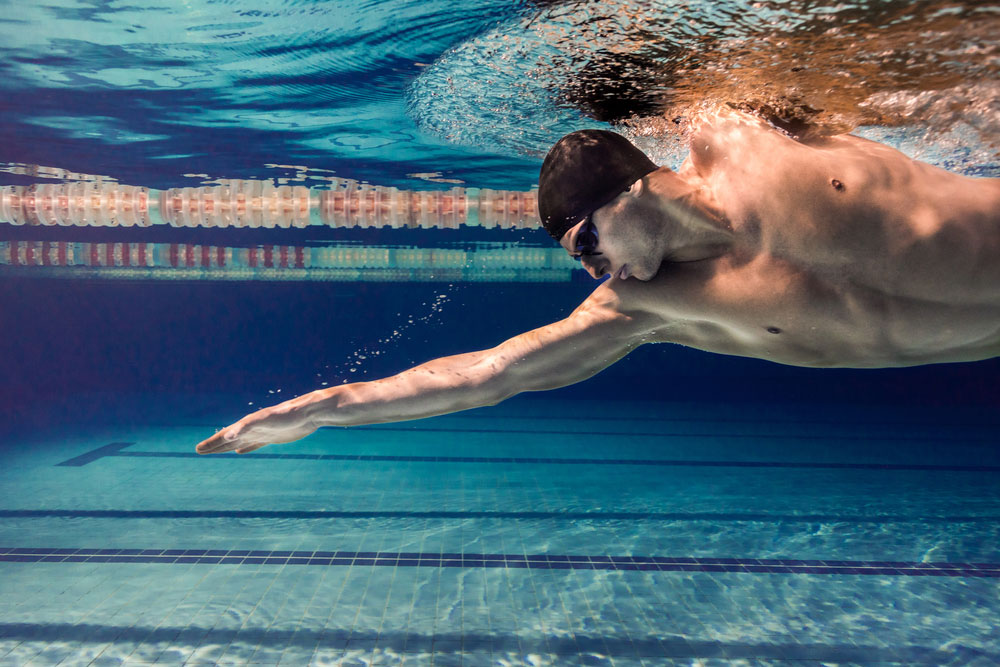Looking at it on a surface level, swimming injuries are unusual compared to other kinds of sports injuries. Besides, swimming is considered one of the best forms of full-body exercise as it works almost every muscle and joint in the body to move through the water.
Swimming has a lot of great benefits—building muscle strength, maintaining cardiovascular fitness, enhancing sleep, increasing endurance, and more to mention. This sport is low-impact and benefits most of us; however, it is still important to learn how to avoid getting injuries as they are common among every swimmer.
Injuries from swimming are usually caused by overuse in the joints and muscles. Other than that, more causes might be present in most swimmers, such as overexertion, short rest periods, poor stroke mechanics, poor breathing technique, lack of flexibility, reduced core strength, and improper swimming technique.
Most swimmers might feel just a little pinch or a slight stiffness within their muscles after a swimming routine, but keep in mind that these mild symptoms might lead to a more painful swimming injury if not taken care of at its earliest.
As much as swimming is a safe sport for everyone, let’s also keep in mind that injuries from this aren’t very much preventable at all.

Do You Have Any Of These Symptoms?
An existing study shows that professional swimmers can swim up to 9 miles a day, equivalent to not more than 2,500 shoulder revolutions. This repetitive nature of swimmers will only increase their risk of overuse-related swimming injuries to their shoulders, knees, back, and neck.
Every swimming injury differs from one person to another, but it is still important for us to get to know our pain to address it well with a trusted physiotherapist for treatment.
If you think that little pinch or slight stiffness that you’re feeling right now is something more, take a look at these common symptoms that could indicate signs of a swimming injury:
Shoulder Pain
In a study including 80 professional swimmers of ages 13-25, 73 of them (91%) have reported having experienced shoulder pain more than once in their lives. This concludes how shoulder pain is a more common problem among swimmers than anyone could imagine, despite referring to swimming as one of the greatest shoulder workouts one can have.
If you have shoulder pain that gets worse during movement, it can be an indication of any of these swimming-related shoulder injuries:
-
Swimmer’s Shoulder – Sharp shoulder pain that gets worse during movement.
-
Bicep Tendonitis – Inflammation of the tendons within the biceps.
-
Shoulder Bursitis – Inflammation of the bursa leads to dull or sharp pain.
-
Shoulder Impingement – Stress and pressure placed on the rotator cuff restrict the movement of the shoulders, finding it hard to move and lift the arms as a result.
-
Instability – When the muscles around the ball and socket of the shoulders are not functioning well.
Knee Pain
This type of symptom is more common among breaststroke swimmers. In one study of 36 surveyed breaststroke swimmers, 75% of them showed at least one to three episodes of knee pain every season, while 47% of them reported experiencing weekly episodes.
Since the breaststroke requires powerful kicking, whipping, and twisting leg movements, it is no surprise if the pain might be present after performing such a stroke as this one.
One of the most common knee injuries is the breaststroker’s knee, which causes sharp pain, swelling, and inflamed knee tissue.
Another result of knee pain could also be bursitis, in which the bursa of the knee gets inflamed, causing trouble bending the knees or even walking.
Neck Pain
Same with the shoulders, the neck is under strain while swimming. Certain strokes in swimming require continuous contortion of the neck muscles, while other strokes force craning of the neck. Other causes of neck pain might result from an existing shoulder injury, as the neck supports the weakened joints and muscles of the damaged shoulder.
These factors may result in tenderness, stiffness, and spasms in the neck, and it may also hurt to turn and move the head from side to side. Some swimmers reported pain in certain positions and even resting their necks.
Back Pain
Who would’ve thought that back pain might be present in this list? Some of us know that swimming is frequently recommended for back pain, but it can also cause back pain.
Swimming puts stress and hyperextension on the lower back, which means it is forced to move above its normal range of movement.
The strain that swimming puts on the muscles and tendons surrounding the back can lead to pain that radiates almost the entire back, which restricts movement and reduces the mobility of the back muscles.
What Can Physiotherapy Do For Your Swimming Injuries?
If you have at least one of the symptoms mentioned above, you might have to consider physiotherapy at this moment. It would help if you never underestimated early symptoms as they will increase your risk of a swimming injury later in the future.
Physiotherapy helps treat injuries and conditions that impact the joints and muscles of the body. This treatment option is also recommended for people dealing with swimming injuries for these reasons:
-
Helps You Understand Your Pain – Before you get into therapy with your physiotherapist, tests and assessments will be conducted first to get a clear understanding of your injury. These tests might also determine some errors in your training plan, biomechanics, or techniques that require changing to avoid another swimming injury in the future.
-
Effectively Treats Common Swimming Injuries – Whether it might be shoulder, knee, neck, or back pain, physiotherapy can effectively treat these common symptoms of a swimming injury through a customized rehabilitation program made for you. Your program might consist of joint mobilization, manual therapy, massage therapy, stretches, and exercises to improve muscle strength, relieve pain, increase range of motion, and regain proper function of the joints and muscles used for swimming.
-
Prevents The Occurrence Of New Swimming Injuries – With physiotherapy, you might not just get only treatment but also comprehensive prevention against swimming injuries. Rehab exercises, home exercises, and consistent prescription might help you recover completely from your injury, followed by modifications in your swim plan to avoid getting another injury in the future.
If you’ve been finding it hard to deal with swimming injuries, you are not alone. Our specialists here at Couve Health may be able to help you recover and enjoy your life without worries of another injury. Book your appointment today and start moving again from your swimming injuries.
Couve Health provides rehab therapies and chiropractic care to Vancouver residents six days a week! Finding a provider that will work with your schedule, and offers availability on weekends can sometimes be difficult. In addition to a schedule that works for patients, insurance billing can be a big obstacle for those seeking chiropractic care. If you’re having trouble finding a chiropractor that will accept your form of insurance, simply give your insurance provider a call and they can help point you in the right direction.
To assist more Vancouver residents in the search for a chiropractor, we accept direct billing from a majority of insurance providers! Making treatment options more accessible to patients only helps take some of the stress out of a journey to recovery.
Ready to learn about the benefits you might get from getting a chiropractic adjustment when you’re in the Vancouver area? Click here to book your first appointment. We can’t wait to help your body heal, and get you some relief!


